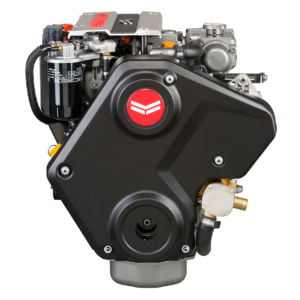
May 19, 2025
The Unsung Hero: Understanding Marine Diesel Engines
While gasoline engines often dominate the conversation in recreational boating, marine diesel engines are the workhorses of the waterways, powering everything from large yachts and commercial vessels to many sailboats. Known for their durability, fuel efficiency, and reliability, understanding the fundamentals of these robust power plants is crucial for any serious boater.
How Marine Diesel Engines Work (The Basics):
Unlike gasoline engines that use spark plugs to ignite the air-fuel mixture, diesel engines rely on compression ignition. Here’s a simplified breakdown:
- Intake: Air is drawn into the cylinder.
- Compression: The piston compresses the air to a very high pressure, causing its temperature to rise significantly.
- Combustion: Highly atomized diesel fuel is injected into the superheated air. The heat ignites the fuel spontaneously.
- Expansion (Power Stroke): The expanding hot gases force the piston down, generating power.
- Exhaust: The waste gases are expelled from the cylinder.
This fundamental difference leads to the characteristic high torque at lower RPMs that diesel engines are known for, making them excellent for pushing heavy boats through the water.
Advantages of Marine Diesel Engines:
- Fuel Efficiency: Diesel fuel contains more energy per gallon than gasoline, and diesel engines typically have better fuel economy, especially at lower speeds and during long runs.
- Durability and Longevity: Diesel engines are generally built with heavier-duty components designed to withstand higher pressures, leading to a longer lifespan compared to gasoline engines.
- Reliability: With fewer electrical components in the ignition system, diesel engines are often considered more reliable, particularly in damp marine environments. However, it’s crucial to prevent water and particulates from contaminating the fuel, which can cause significant issues.
- Lower Flammability of Fuel: Diesel fuel is less volatile than gasoline, reducing the risk of fire.
- High Torque: The high torque output is ideal for maneuvering heavy vessels and maintaining speed in challenging conditions.
Key Components of a Marine Diesel Engine System:
Understanding the main components is essential for basic maintenance and troubleshooting:
- Engine Block and Cylinders: The core structure of the engine where combustion occurs.
- Cylinder Head: Seals the top of the cylinders and houses valves, injectors, and passages.
- Pistons, Connecting Rods, and Crankshaft: Convert linear motion into rotational power.
- Fuel System: Includes the fuel tank, lift pump, primary and secondary fuel filters, fuel injection pump, injectors, and fuel lines. Maintaining clean fuel is paramount.
- Cooling System: Typically a closed fresh-water cooling system with a heat exchanger that uses raw seawater to dissipate heat. Maintaining proper coolant levels and a clean raw water intake is critical to prevent overheating.
- Lubrication System: Includes the oil pan, oil pump, oil filters, and oil cooler, ensuring vital engine components are lubricated to minimize wear.
- Air Intake and Exhaust System: Allows the engine to “breathe” clean air and expel combustion gases. Restrictions in either system can impact performance.
- Starting System: Consists of batteries, starter motor, and associated wiring.
- Transmission/Gearbox: Reduces engine RPM and reverses the direction of propeller rotation.
Maintenance is Key to Diesel Longevity:
While robust, marine diesel engines require diligent maintenance to ensure reliable operation and prevent costly repairs. Key maintenance tasks include:
- Regular Oil and Filter Changes: Following the manufacturer’s recommended intervals.
- Fuel Filter Changes: Regularly replacing both primary and secondary fuel filters to remove water and contaminants.
- Cooling System Service: Checking coolant levels, inspecting hoses and clamps, flushing the system, and maintaining the raw water intake and strainer. Replacing the seawater pump impeller according to schedule is crucial.
- Belt and Hose Inspection: Checking for wear, cracks, and proper tension.
- Battery Maintenance: Ensuring clean and tight connections and proper charge.
- ** регулярная проверка анодов (Regular Anode Inspection):** Preventing galvanic corrosion, especially in saltwater environments.
- Engine Flushing (Especially after saltwater use): To remove salt deposits.
- Winterization: In colder climates, proper winterization is essential to prevent freeze damage.
Common Marine Diesel Engine Problems:
Even with good maintenance, issues can arise:
- Difficulty Starting: Often related to battery issues, fuel supply problems (air in the lines), or faulty glow plugs (in colder conditions).
- Overheating: Usually caused by problems with the cooling system, such as a blocked raw water intake, faulty impeller, or low coolant.
- Loss of Power: Can stem from clogged fuel filters, air intake restrictions, a damaged propeller, or issues with the turbocharger (if equipped).
- Excessive Smoke: Black smoke often indicates incomplete combustion, blue smoke suggests oil burning, and white smoke can point to water in the fuel or a coolant leak.
- Unusual Noises: Can signal a variety of mechanical issues.
Choosing a Marine Diesel Engine and Service:
When selecting a marine diesel engine for your boat or seeking service, consider reputable brands known for their reliability and support, such as Yanmar, Westerbeke, Volvo Penta, and Mercury. For service in the Kemah, TX area, Yes Centers offers expertise in marine diesel engine repair and maintenance.
Conclusion:
Marine diesel engines are a vital component of many vessels, offering a blend of power, efficiency, and longevity. Understanding their operation, adhering to a strict maintenance schedule, and knowing when to seek professional help are crucial for ensuring years of reliable performance on the water. For boat owners in Kemah, TX, Yes Centers is your trusted partner for all your marine diesel engine needs.
